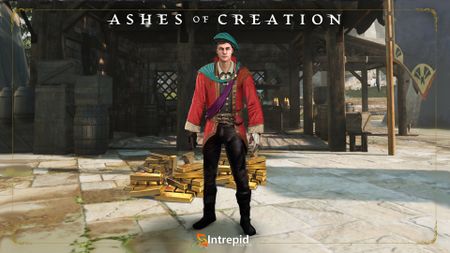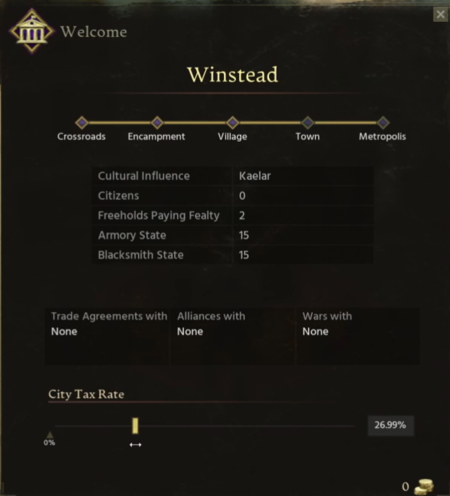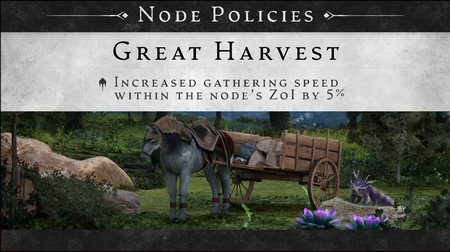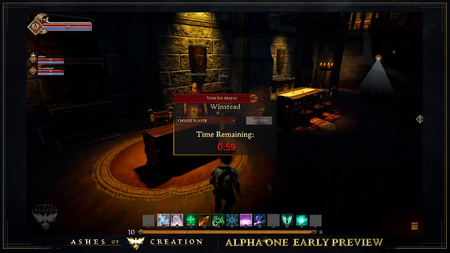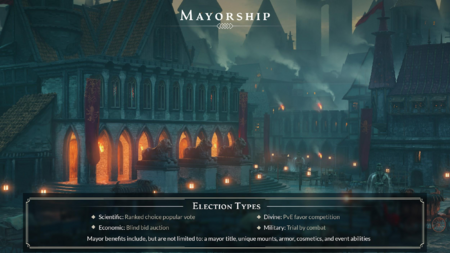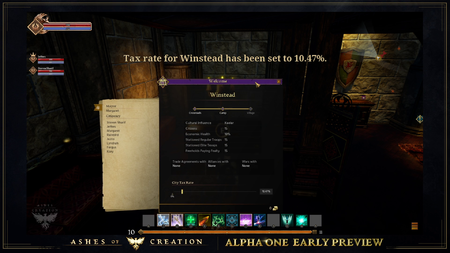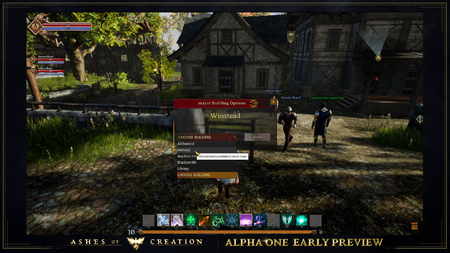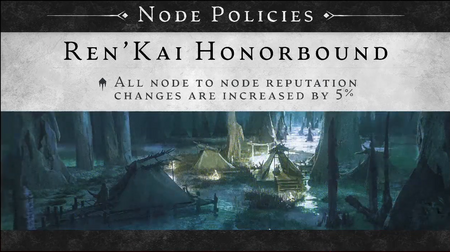Node leadership powers
Los oficiales dentro del gobierno disponen de importantes poderes de liderazgo.[3]
- Marcar a los ciudadanos extranjeros de otros nodos como enemigos del estado.[4][5]
- Llevar a cabo acuerdos comerciales con otros nodos.[4]
- Los alcaldes pueden establecer impuestos en sus nodos.[7]
- Esto incluye tasas impositivas que aplican a los juegos de taberna.[8][9]
- Asignar el dinero recaudado mediante los impuestos.[6][2]
- Asignar los fondos del tesoro a proyectos de construcción y/o a mejorar las estructuras defensivas del nodo, como muros y puertas más fuertas, trampas, y equipo de asedio.[6][10][11][2]
- Los alcaldes también pueden asignar fondos del tesoro para contratar mercenarios PNJs para defender su nodo durante un asedio.[12][2]
- El dinero de los impuestos solo se puede usar para financiar el desarrollo del nodo.[13]
- Los alcaldes pueden iniciar un sistema de misiones en el que los no ciudadanos puedan participar. El alcalde puede usar una parte de la tesorería o de los bienes del nodo como recompensa por completar la misión. Los jugadores podrán interactuar con el nodo para ver las misiones que hay disponibles para ellos..[14]
- Estas misiones se pueden emplear para traer materiales que ayuden a combatir la atrofia de los nodos.[14]
- Los nodos disponen de una serie de npolíticas de nodo que son propuestas por el alcalde, y que son votadas por los ciudadanos.[15][6]
- There are levers and dials that are present to both the owners of Castles as well as the elected officials of Nodes that during their administration they have the ability to impact and influence the region around them.[18] – Steven Sharif
Los clanes no controlan los nodos.[19][20] Los líderes de clan (reyes y reinas) pueden llegar a ser alcaldes de los nodos.[21]
- Los clanes tienen roles diferentes en cuanto al nodo respecto a los que tienen los ciudadanos particulares.[2]
- Solo un ciert número de clanes puede participar en estos roles.[2]
- La separación de roles de gremio están reservados para gremios peques, medianos y grandes.[2]
- Guild’s also hold separate roles in the direction of the node, than the roles held by private citizens, and only a certain number of guilds may participate in these roles. Separate guild roles are reserved for Small size guilds, medium size guilds and large size guilds.[2]
Alcaldes
Los alcaldes son los gobernantes del nodo y los que controlan el desarrollo de ese nodo.[23]
- Coordinar el tráfico de los recursos que los ciudadanos necesitan mediante el uso de las caravanas.[25]
- Otras tareas del gobernante.[23]
Solo los ciudadanos de los nodos pueden ser elegidos como alcaldes.[21]
- Solo un ciudadanos puede ser elegido por cuenta y por servidor.[21][26]
- Esto podría cambiar a un ciudadano por cuenta.[27]
- Un rey o una reina también puede convertirse en alcalde.[21]
- You may only ever be a citizen of a single node at a time.[21] – Steven Sharif
Los alcaldes obtienen nuevos poderes y responsabilidades conforme el nodo avanza.[28]
- Los nodos tienen una serie de políticas de nodo que son propuestas por el alcalde y votadas por los ciudadanos.[15][6]
- El título de alcalda desbloquea habilidades especiales, así como stats durante los asedios o eventos.[29]
- Los alcaldes son avisados cuando su nodo es citado en un pergamino de declaración de asedio.[30]
- The mayor is made aware of what scroll has been generated if their node is the one that's named on the scroll.[30] – Steven Sharif
Node policies
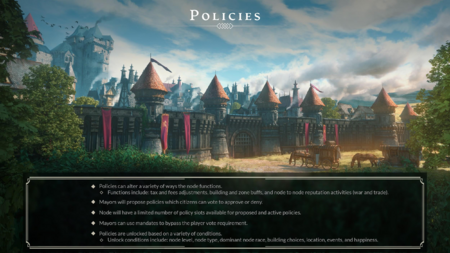
Nodes have a number of slots that they get to employ as Government policies that are enacted and chosen by the mayor and voted on by the people; and certain policies get unlocked by certain happiness states of the factions within the node; and those happiness states are predicated across different achievements that can happen in the world story arcs that get finished; bosses that get killed around you; new buildings that get constructed: Lots of different things can contribute to that happiness value: Number of citizens; number of citizens you've had leave; number of houses that might have been foreclosed upon. There's lots of different things that influence it, but when the happiness is met at a certain point- and even without that happiness you can still have policies that you get to enact regardless. You may choose policies that do certain things for the node; and this is a big strategic decision that the node has to almost agree on because it's voted on by the citizens within a short time period, but elected by the outstanding mayor; and when you deploy a policy it confers benefits to the citizens, or to the area, or to specific buildings, or to the mayor.[15] – Steven Sharif
Node policies affect a variety of node functions, such as taxes and fees, building and zone buffs, and node-to-node reputation activities, such as trade agreements, and node wars.[31][32]
- Alcaldes propose node policies that are voted on by citizens within a 24-hour or shorter time period.[31][32][15][6]
- Policies are voted in if the majority of voters approve of them.[33]
- Mayors can utilize their available mandates to bypass policy votes.[31][32][34]
- Mayors may also be able to take emergency actions depending on certain predicates that get met. This might allow them to reduce the voting threshold or voting time for policies.[33][15]
- There are a limited number of policy slots available to be proposed.[31][32] Some policies occupy multiple slots.[15]
- Node policies that are deployed will provide benefits to various aspects of the node, its citizens, its ZOI, its vassals (in some cases), specific buildings, and to its mayor.[33][15]
- Certain policies may affect the visual appearance of the node.[35]
- Some of the benefits you can receive by being a vassal of a certain parent is access to a policy that your node not might not normally have access to; and in fact you can also unlock an additional policy slot based on certain conditions that the parent or Sovereign node may have access to in their reliquary, or in their achievement systems, or in policies that they've elected. Some policies occupy multiple slots and it's almost like a card structure. You have each of these policies that live on a card and you get to select that card- throw it into the slot it goes out to the citizens to vote on within the 24-hour or sometimes shorter period. The mayor has emergency actions they can take right depending on certain predicates that get met and if an emergency action occurs they may be able to spend their influence as mayor within their term to set up a policy for a vote within an hour's period of time; and citizens in that way they can sneak it through a bit.[15] – Steven Sharif
Policies are unlocked by various conditions within a node.[31][32][15][6]
- Node level.[31][32]
- Node type.[31][32]
- Dominant node race.[31][32][15]
- Building choices.[31][32][15]
- Location of the node.[31][32]
- Events, such as node wars and node sieges.[33][31][32]
- Node happiness.[31][32][36][37]
- Logros based on the completion of story arcs.[15]
- Jefes de mundo that are defeated.[15]
- Node citizens gained (or lost).[15]
- Carcasa del nodo foreclosed upon.[15]
- There's a lot of different things that policies can influence; and policies exist within certain denominations. You have some policies that might be reflective of the culture that the node is representing; and you get access to those cultural policies. You have some policies that might become available because you've constructed a certain building type and now you've attracted a guild of NPCs that are weapons smiths. You might have some policies that are social organizations representative- you only get to build one social organization or Temple: which religion does the node follow. All of these are customization points that the city gets to choose and now you as a citizen get to identify the city that best aligns with your progression within the game and your game style and gameplay.[15] – Steven Sharif
Elecciones en los nodos
Una vez que un nodo ha alcanzado la fase de aldea habrá un período de "cooldown" de una semana antes de que comiencen las elecciones del nodo.[39]
- Este período de "cooldown" permitirá a los jugadores establecerse como ciudadanos en la aldea; lo que quizá implique renunciar a la ciudadanía que tuviera en otro nodo .[39]
- Después del "cooldown" inicial, habrá una semana de proceso electoral; a partir de ese momento y en adelante, las elecciones tendrán una preiodicidad mensual.[39]
- Los asedios del nodo no podrán ser declarados en los siguiente 21 días del avance del nodo a cualquier fase.[40]
The village stage is a unique stage because that's when the government system comes online and all other stages past village there will have already been a cadence for the election system and it will follow that cadence, but after the initial village stage is completed there will be a one week period where players have an opportunity to establish citizenship at the village that also provides for the cooldown time that is- that would be present on players leaving another node to participate in in this particular node leveling up. But that after that one week period then there will be a one-week election process and then from that point moving forward will be the one month cadence that the node experiences elections on.[39] – Steven Sharif
Las elecciones en los nodos tienen una periodicidad mensual.[39][42]
- Las noticias relacionadas con las elecciones serán enviadas al email de los ciudadanos.[43]
- Solo los ciudadanos de un nodo podrán participar en sus elecciones.[2]
- Solo los ciudadanos del nodo podrán ser elegidos como alcaldes.[21]
- Un rey o reina también puede ser declarado alcalde.[21]
El gobierno en los nodos y los alcaldes se eligen de formas diferentes en función del tipo de nodo.[44][28]
El gobierno en los nodos divinos es elegido por los ciudadanos mediante la realización de misiones que prueben la devoción y dedicación con el nodo.[45][44]
- La mayoría de estas tareas van a ser individuales y no emplearán ayuda externa.[46]
El gobierno de los nodos económicos podrá ser comprado y vendido por los ciudadanos con más dinero.[45][44]
- Los desarrolladores están a favor de que haya una campaña de financiación pública para los fondos de la campaña y de las contribuciones para los candidatos a la alcaldía.[47]
- Los alcaldes de los nodos militares son elegidos entre los ciudadanos a través de una arena de combate del último hombre en pie (estilo arena de gladiadores).[45][48][49]
- Una idea que está ahora mismo bajo consideración es que los jugadores preparen un campeón con el que luego puedan luchar en la arena, en lugar de usar sus personajes habituales. Este campeón podría ser preparado con equipo y habilidades a través de misiones, además de con materiales y oro con el objetivo de hacer el campeón más poderoso.[50]
- El motivo de esta idea del campeón es que el juego no está equilibrado para el Pvp 1vs1. Emplear estos campeones hará que la arena esté más equilibrada.[50]
- El estilo de combate de la arena será instanciado pero se permitirán espectadores a través de una interfaz.[51]
- El ganador del combate no podrá transferir la alcaldía a otro jugador.[52]
La elección del gobierno de los nodos científicos se realiza mediante un proceso democrático.[45][44] Los registros de a quien voto cada ciudadanos no son públicos.[43]
Node election types
Alcaldes are chosen through different methods according to the node's type.[44][28]
El gobierno en los nodos divinos es elegido por los ciudadanos mediante la realización de misiones que prueben la devoción y dedicación con el nodo.[45][44]
- La mayoría de estas tareas van a ser individuales y no emplearán ayuda externa.[46]
El gobierno de los nodos económicos podrá ser comprado y vendido por los ciudadanos con más dinero.[45][44]
- Los desarrolladores están a favor de que haya una campaña de financiación pública para los fondos de la campaña y de las contribuciones para los candidatos a la alcaldía.[47]
- Los alcaldes de los nodos militares son elegidos entre los ciudadanos a través de una arena de combate del último hombre en pie (estilo arena de gladiadores).[45][48][49]
- Una idea que está ahora mismo bajo consideración es que los jugadores preparen un campeón con el que luego puedan luchar en la arena, en lugar de usar sus personajes habituales. Este campeón podría ser preparado con equipo y habilidades a través de misiones, además de con materiales y oro con el objetivo de hacer el campeón más poderoso.[50]
- El motivo de esta idea del campeón es que el juego no está equilibrado para el Pvp 1vs1. Emplear estos campeones hará que la arena esté más equilibrada.[50]
- El estilo de combate de la arena será instanciado pero se permitirán espectadores a través de una interfaz.[51]
- El ganador del combate no podrá transferir la alcaldía a otro jugador.[52]
La elección del gobierno de los nodos científicos se realiza mediante un proceso democrático.[45][44] Los registros de a quien voto cada ciudadanos no son públicos.[43]
Taxation
Los alcaldes pueden establecer los impuestos en sus nodos.[7]
- Esto incluye los impuestos para los juegos de taberna.[8][9]
Los alcaldes/gobernantes de los nodos asignan recursos, impuestos, and misiones para ayudar a desarrollar las defensas de los nodos.[24]
- El dinero de los impuestos solo se puede destinar al desarrollo de los nodos. Este oro no puede ser retirado por el alcalde ni por ningún otro jugador.[54][13]
- Las tasas de los impuestos varían según el momento en el que el jugador se unió al nodo como ciudadano. el objetivo de esto, es aplicar cierta presión financiera sobre las poblaciones de los nodos, haciendo que los impuestos sean cada vez más altos conforme el nodo avanza en lugar de establecer límites de población.[55]
Los nodos madre (soberanos) se llevan una parte de los impuestos de la vivienda así como de los servicios que se den en cualquier de sus nodos vasallos.[54][56]
- Estos impuestos no tienen porqué afectar a los ciudadanos, ya que los niveles de impuestos de los ciudadanos vienen impuestos directamente por su nodo,pero las finanzas del nodo si que se ven afectadas por los impuestos recaudados por los nodos madre (soberanos).[56]
When a node reaches stage 3 (Aldea) and a player run government has formed, all player housing will pay taxes.[57]
- A player's tax charge will be determined by the number of structures built on their plot.[58][13]
- Freehold taxes are calculated based on the number of permits issued for buildings on a freehold.[59][60][61][58][13]
- Buildings that require permits will have additional upkeep costs.[59]
- Maintaining businesses requires licensing and payments to the node your Freehold is associated with. This permitting system allows for a certain number of buildings to be constructed on a Freehold. Permits can be obtained from the same node the Freehold was certified from, and buildings that require permits will have an additional upkeep cost.[59]
- Housing foreclosures result from failing to pay property taxes or other fees.[59]
Estilo y diseño de los nodos
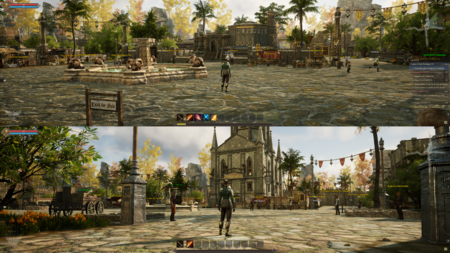
The layout and architecture within a Node’s development area are determined by influential race. For example, a stage 3 Node with the majority of player contribution being Py'rai would have a Py'rai village with Py'rai architecture. Most NPCs would be Py'rai elves, and offer questlines within the Py'rai narrative.[28] – Margaret Krohn
Each player’s contributed experience is flagged with their character race and other identifiers. When a Node advances, the race with the highest experience contribution determines the Node’s style and culture. This style and culture change can happen at every Node Stage. For example, if a Node advances to Level 2 - Encampment Stage and 51% of all experience was earned by Ren’Kai players, the Node will be a Level 2 Ren’Kai Node. If that same Node advances to a Level 3 - Village Stage Node, but the Py'Rai contributed 62% of all the experience earned, then the Node will be a Level 3 Py'Rai Node.[62] – Margaret Krohn
El diseño de un nodo y su estilo es determinado por varios factores:[63]
- La localización y el entorno (bioma) del nodo.[64][65][63]
- Nodes will adjust the local topography to fit the aesthetic and mechanical requirements of the node.[64] – Steven Sharif
- Los nodos ajustarán la topografía local para adaptarse a los requisitos estéticos y mecánicos del nodo.[66]
Currently the way that the platform system is set up, is it's capable of adjusting the topography of the node's footprint, regardless of the surrounding terrain. So the reason for that is we want to have flexibility in the presentation of the node's layout and how it is essentially both from an aesthetic standpoint as well as a mechanical standpoint with node sieges- how it's constructed and that construction should have the ability to take on a variance of different types of topography. So it shouldn't be dependent on the surrounding area. Now that's not to say that the surrounding area isn't going to have some influence over. So for example... we're experimenting a little bit with the platform tech and putting up a node up against the side of a mountain or on the edge of a cliff or something that has a beautiful vista. Those are things that we're going to test out obviously as we continue to work on the node tool and how that platform system works, but the idea is to have the node independent of the surrounding terrain.[66] – Steven Sharif
- El tipo de nodo.[63]
Some parts are determined by the area it's in. Some parts are determined by the type it is. Some parts are determined by the race it is; and then the rest of it is determined by the mayor.[63] – Jeffrey Bard
- La raza que contribuya con el porcentaje más alto al avance del nodo modificará la apariencia racial de sus edificios, NPCs y objetos.[67][65][62][63][68][69]
- Las razas relacionadas entre ellas no combinan sus influencias culturales. Por ejemplo, los Py'Rai y los Empyrean cuentan como culturas diferentes. Su raza madre, los Pyrian, ya no existen.[70]
- Este cambio de estilo y cultura ocurre en cada etapa del nodo.[62]
- Esto aplica para todos los nodos, incluso los nodos de castillo.[18]
All nodes whether they're associated with a castle or associated with normal node structure has cultural influences that replicate over to the buildings that are produced and the NPCs that are present.[18] – Steven Sharif
- El resto es determinado por el alcalde del nodo.[63]
- Debería ser posible completar varios proyectos de construcción en un nodo durante el mes en el que el alcalde ostenta su cargo.[71]
- Q: How long would you say it will take players on average to fill slash build up a node completely from wilderness to metropolis?
- A: It's one thing to get a node to a certain level: it's another thing to develop the node; and I can't really give you an on-average expectation, because there's a lot of variables at play. There's how many citizens does the node have attracted to it; what's the type of traffic that the node is attracting to it based on things like its tax rates, or the specialization that it chose to spec into, based on the building types it's chosen to build. All of those things are variables that can affect the quote-unquote "average build-out time" of a particular node. So it's difficult to give you an average when there's so many variables along those lines. But the idea is that if there is a particular project that players are interested in in developing based on the node stage, that they would have the ability to complete several of those projects as within a single term of a mayor; and a term of a mayor is one month.[71] – Steven Sharif
Service buildings
El gobierno del nodo decide la ubicación y los tipos de edificios de nodo que serán edificador en cada sector del nodo.[74][75][76]
These are buildings that the mayor has agency over determining whether or not they should be a constructed project. Constructible buildings can be selected at open plots that are gained as the node advances. If they elect to begin construction of one of these types of buildings- one of which is the marketplace- it'll grant certain trade benefits as well as some stalls that the citizens may participate in.[77] – Steven Sharif
Los gobernantes deciden como especializar su nodo. Una vez determinadas elecciones han sido tomadas no se podrá cambiar a otras opciones.[74]
- Los edificios del nodo disponen de un "arbol tecnológico" basado en la etapa del nodo. Cada etapa ofrece mejores servicios al nodo, pero se debe cumplis con los requisitos previos para la construcción del edificio.[78]
- Diferentes gobernantes pueden cambiar los edificios dentro de un nodo.[74]
And there could be regime change... If somebody doesn't like the fact that a market was built and they want to re-elect a new government next cycle, they can do so... and that market could be destroyed and a new building take its place.[74]
Cuando el tipo de edificios haya sido escogido, la comunidad tiene que traer rrecursos al nodo (empleando caravanas) ay unirse para construirlos (mediante misiones y similares).[74]
- Los materiales aportados para la construcción de un edificio del nodo se pierden si el alcalde desechar el proyecto.[79]
- El número de edificios, así como la localización de los mismos dentro de un nodo están predefinidos.[75]
Node politics
No habrá mecánicas relacionadas con guerras civiles en los nodos, pero si que habrá margen para conflictos internos; como puedan ser socavar el liderazgo del actual gobierno o interrumpir las rutas comerciales.[80]
- La única forma de expulsar a un alcalde antes de que termine su mandato es destruyendo el nodo.[81]
We want consequences to matter and if that person got elected then you need to work within the means of the mechanics to get them unelected.[81] – Steven Sharif
Node-to-node reputation
Node-to-node reputation activities include trade agreements and wars between nodes.[31][32]
- Completing mayoral commissions will reward node-to-node reputation.[31][82]
Ver además
Referencias
- ↑
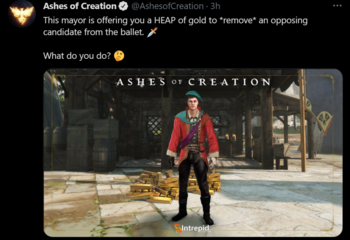
- ↑ 2.0 2.1 2.2 2.3 2.4 2.5 2.6 2.7 2.8 MMOGames interview, January 2017
- ↑

- ↑ 4.0 4.1 4.2 City hall.
- ↑
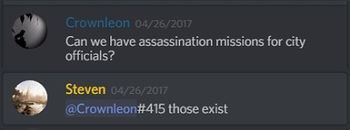
- ↑ 6.0 6.1 6.2 6.3 6.4 6.5 6.6 Transmisión en vivo, 2022-04-29 (27:42).
- ↑ 7.0 7.1 7.2 Transmisión en vivo, 2020-03-28 (1:03:38).
- ↑ 8.0 8.1

- ↑ 9.0 9.1

- ↑ Transmisión en vivo, 2020-07-25 (1:22:40).
- ↑ Transmisión en vivo, 2018-01-18 (37:05).
- ↑ Transmisión en vivo, 2020-06-26 (59:11).
- ↑ 13.0 13.1 13.2 13.3

- ↑ 14.0 14.1 Entrevista, 2020-07-08 (1:04:05).
- ↑ 15.00 15.01 15.02 15.03 15.04 15.05 15.06 15.07 15.08 15.09 15.10 15.11 15.12 15.13 15.14 15.15 15.16 15.17 Transmisión en vivo, 2022-08-26 (1:12:40).
- ↑

- ↑ Transmisión en vivo, 2017-05-19 (36:05).
- ↑ 18.0 18.1 18.2 Entrevista, 2018-05-11 (47:27).
- ↑ Transmisión en vivo, 2017-05-19 (36:09).
- ↑
- ↑ 21.0 21.1 21.2 21.3 21.4 21.5 21.6 21.7

- ↑ Transmisión en vivo, 2018-12-12 (14:48).
- ↑ 23.0 23.1 Transmisión en vivo, 2017-11-17 (9:49).
- ↑ 24.0 24.1
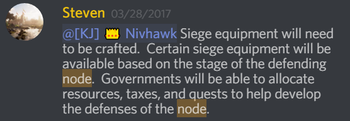
- ↑ 25.0 25.1 Transmisión en vivo, 2017-06-30 (53:57).
- ↑ 26.0 26.1 Entrevista, 2018-05-11 (50:05).
- ↑ Entrevista, 2018-10-20 (2:36).
- ↑ 28.0 28.1 28.2 28.3 Blog - Know Your Nodes - The Basics.
- ↑ Transmisión en vivo, 2020-07-25 (1:52:45).
- ↑ 30.0 30.1 Transmisión en vivo, 2021-12-23 (1:30:34).
- ↑ 31.00 31.01 31.02 31.03 31.04 31.05 31.06 31.07 31.08 31.09 31.10 31.11 31.12 31.13 31.14 31.15 Blog: Development Update with Village Node.
- ↑ 32.00 32.01 32.02 32.03 32.04 32.05 32.06 32.07 32.08 32.09 32.10 32.11 32.12 32.13 Transmisión en vivo, 2023-08-31 (44:21).
- ↑ 33.0 33.1 33.2 33.3 Transmisión en vivo, 2023-08-31 (47:43).
- ↑ Transmisión en vivo, 2023-08-31 (31:44).
- ↑ Transmisión en vivo, 2023-08-31 (49:13).
- ↑ 36.0 36.1 Transmisión en vivo, 2023-04-07 (1:19:41).
- ↑ 37.0 37.1 Transmisión en vivo, 2022-08-26 (1:17:04).
- ↑ Transmisión en vivo, 2020-03-28 (1:01:34).
- ↑ 39.0 39.1 39.2 39.3 39.4 Entrevista, 2020-03-27 (6:03).
- ↑
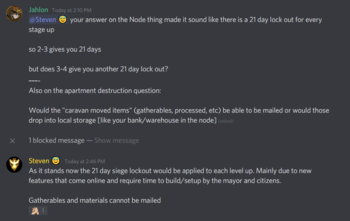
- ↑

- ↑

- ↑ 43.0 43.1 43.2 Transmisión en vivo, 2020-10-30 (1:01:00).
- ↑ 44.0 44.1 44.2 44.3 44.4 44.5 44.6 44.7 Node series part II – the Metropolis.
- ↑ 45.0 45.1 45.2 45.3 45.4 45.5 45.6 45.7 Entrevista, 2020-07-19 (26:54).
- ↑ 46.0 46.1 Transmisión en vivo, 2021-03-26 (1:18:26).
- ↑ 47.0 47.1 Transmisión en vivo, 2021-11-19 (51:56).
- ↑ 48.0 48.1

- ↑ 49.0 49.1 Pódcast, 2018-05-11 (52:20).
- ↑ 50.0 50.1 50.2 50.3 Entrevista, 2020-03-27 (09:05).
- ↑ 51.0 51.1 Entrevista, 2020-03-27 (11:04).
- ↑ 52.0 52.1 Transmisión en vivo, 2021-03-26 (1:17:20).
- ↑ Transmisión en vivo, 2023-08-31 (24:54).
- ↑ 54.0 54.1 Transmisión en vivo, 2022-08-26 (1:10:16).
- ↑ Entrevista, 2020-03-27 (0:30).
- ↑ 56.0 56.1 Entrevista, 2018-05-11 (57:02).
- ↑

- ↑ 58.0 58.1 Transmisión en vivo, 2023-06-30 (1:45:22).
- ↑ 59.0 59.1 59.2 59.3 Blog: Exploring the Boundless Opportunities of Freeholds.
- ↑

- ↑ Entrevista, 2023-07-09 (54:46).
- ↑ 62.0 62.1 62.2 Blog - Know Your Nodes - Advance and Destroy.
- ↑ 63.0 63.1 63.2 63.3 63.4 63.5 Transmisión en vivo, 2018-09-27 (53:06).
- ↑ 64.0 64.1 Transmisión en vivo, 2022-02-25 (41:00).
- ↑ 65.0 65.1 Transmisión en vivo, 2020-10-30 (39:17).
- ↑ 66.0 66.1 Transmisión en vivo, 2021-02-26 (1:12:18).
- ↑ Pódcast, 2021-04-11 (29:47).
- ↑ Entrevista, 2018-05-11 (54:34).
- ↑ Transmisión en vivo, 2017-05-26 (21:23).
- ↑ Pódcast, 2021-04-11 (23:36).
- ↑ 71.0 71.1 Transmisión en vivo, 2022-07-29 (1:13:09).
- ↑ Transmisión en vivo, 2020-03-28 (1:16:03).
- ↑ Vídeo, 2020-03-23 (0:24).
- ↑ 74.0 74.1 74.2 74.3 74.4 Transmisión en vivo, 2017-05-19 (33:57).
- ↑ 75.0 75.1 Transmisión en vivo, 2018-01-20 (38:17).
- ↑ Transmisión en vivo, 2018-04-8 (PM) (51:49).
- ↑ Entrevista, 2020-07-08 (55:05).
- ↑ Transmisión en vivo, 2022-03-31 (1:13:00).
- ↑ Transmisión en vivo, 2021-07-30 (1:10:09).
- ↑ Transmisión en vivo, 2017-05-24 (40:50).
- ↑ 81.0 81.1 Transmisión en vivo, 2019-06-28 (1:26:14).
- ↑ Transmisión en vivo, 2023-08-31 (39:17).
